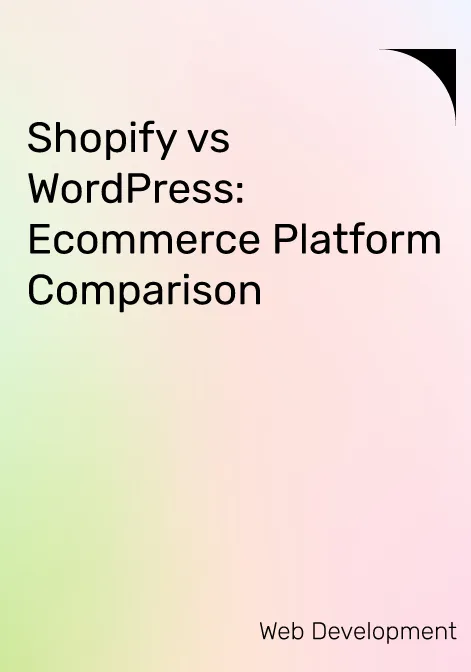Building an online store is exciting, but choosing the right platform is crucial for success. Shopify and WordPress with WooCommerce are two popular options, understanding their strengths, and weaknesses, and how they align with your needs is essential to choosing between them.
Here are some key aspects to help you make an informed decision.
Ease of Use:
-
Shopify: Known for its user-friendly interface, drag-and-drop capabilities, and minimal technical requirements. It is ideal for beginners who do not have any coding experience.
-
WordPress: It requires more technical knowledge to set up and customize. WordPress plugins like WooCommerce add e-commerce functionality but can also complicate things.
Flexibility and Customization:
-
WordPress: WordPress stands out for its remarkable flexibility, offering a plethora of customization options that cover various aspects of web development. From coding to theme customization and plugin development, WordPress empowers users to tailor their websites according to their unique needs and preferences.
-
Shopify: It offers pre-built solutions for common features, but its choice of themes and apps is limited. For highly customized needs, it is less flexible.
Cost:
-
Shopify: Charges monthly subscription fees based on your store’s size and features. Transaction fees might also apply.
-
WordPress: Open-source software is free, but hosting, domain, and additional plugins incur individual costs. Offers more control over budget allocation.
Additional Reads: Frontend Development Trends
Scalability:
-
Shopify: Designed for scalability with built-in features and apps to accommodate growth. However, higher subscription costs might apply as your store expands.
-
WordPress: Highly scalable with custom plugins and development but requires technical expertise and potentially higher development costs for complex needs.
SEO and Marketing:
-
WordPress: Excellent SEO capabilities with plugins and customization options, allowing for targeted content and search engine optimization.
-
Shopify: Built-in SEO features are good, but advanced customization might require additional apps or expert help.
Community and Support:
-
WordPress: Large and active community with extensive online resources, tutorials, and forums. However, troubleshooting technical issues might require self-reliance or paid support.
-
Shopify: Dedicated customer support team and comprehensive knowledge base. However, individual support plans might incur additional costs.
Target Audience:
-
Shopify: Ideal for beginners, small businesses, and entrepreneurs with limited technical knowledge seeking a quick, user-friendly solution.
-
WordPress: Geared towards tech-savvy users, larger businesses, and those prioritizing flexibility, customization, and budget control.
Specific Needs:
-
Shopify: Offers built-in features for managing products, payments, and shipping and excels at ease of use, scalability, and ease of use. Suitable for selling a limited to moderate number of products without complex customizations.
-
WordPress: Offering extensive customization options through themes and plugins, and strong content marketing and SEO capabilities. Suitable for businesses that sell a wide variety of products, need unique store designs, or want full control over their online presence.
Integrations:
-
Both: Integrate with popular payment gateways, marketing tools, and shipping solutions like Stripe, PayPal, Mailchimp, and ShipStation.
-
Shopify: Offers a wider range of pre-built integrations through its App Store.
-
WordPress: Requires individual plugin installations for specific integrations, potentially requiring more technical knowledge or plugin compatibility checks.
Apps and Plugins:
-
Shopify: Vast App Store with paid and free apps for adding features, managing marketing, and customizing your store.
-
WordPress: Abundant plugins available, both free and premium, offering diverse functionalities. However, managing compatibility and updates might require more effort.
Transaction Fees:
-
Shopify: Charges transaction fees (2-2.9% + 30 cents) on top of monthly subscription fees.
-
WordPress: The platform charges No transaction fees, but individual payment gateways might have their own fees. Hosting and plugin costs can also impact overall expenses.
Security:
-
Both: Implement security measures like data encryption and fraud prevention tools.
-
Shopify: Handles server security and provides basic fraud protection.
-
WordPress: Requires choosing a secure hosting provider and selecting plugins for additional security features. User responsibility plays a larger role.
Real-Life Examples:
-
Shopify: Successful stores like MVMT Watches, Allbirds, and Kylie Cosmetics leverage its user-friendly interface and scalability.
-
WordPress: Websites like The Honest Company, TechCrunch, and The New York Times utilize its flexibility and content management capabilities for their online stores.
Conclusion:
Consider your technical skills, budget, store size, and customization needs. Shopify excels in ease of use and built-in features, ideal for beginners or quick launches. WordPress offers unmatched flexibility and customization but requires more technical expertise. No single platform is “best.” Choose the one that aligns with your specific goals and priorities.
Additional Reads: SEO Mistakes In Web Development
Choose Shopify if:
-
You’re a beginner with limited technical knowledge.
-
You prioritize ease of use and a quick launch.
-
You need a scalable solution with built-in features.
-
You’re comfortable with monthly subscription fees.
Choose WordPress if:
-
You prioritize flexibility and complete customization.
-
You have the technical expertise or access to developers.
-
You want more control over SEO and marketing.
-
You’re more budget-conscious and prefer individual cost allocation.




